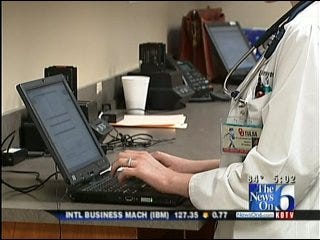City of Tulsa Awarded Grant For Electronic Medical Records
The city of Tulsa has been awarded a major grant, with the promise of improving healthcare for almost everyone.Wednesday, May 5th 2010, 5:55 pm
By Emory Bryan, The News On 6
TULSA, OK -- The city of Tulsa has been awarded a major grant, with the promise of improving healthcare for almost everyone.
It's a $12 million stimulus grant to build an electronic system to share medical records.
While many doctors keep medical records on computers, they can't access records created outside their own office.
That will change, because the government picked Tulsa for a pilot project, to make those connections, and see if it improves health care.
At Dr. Pat Daley's office, all the medical records are on paper, in file folders, or stacked on shelves.
It's the way he's always done it and while he's sold on the value of going electronic, he's not ready to start.
"So there are so many good reasons to do it but right now cost is a factor and certainly time to learn that and getting good at that so it doesn't slow you down too much," Dr. Daley, pediatrician, said.
The new pilot project in Tulsa aims to improve healthcare by replacing paper files with electronic files.
Doctors and nurses will create the electronic records, which will then be shared among clinics, hospitals, and first responders.
"Literally at the fingertips of the paramedics, they'll be able to look up information about the patient, figure out what medications they're on, what kind of allergies they have and who their physician is," Frank Gresh, with EMSA, said.
This group represents just about every healthcare provider in Tulsa. They've all agreed to create and share electronic medical records, as long as the individual patients agree.
"So they can give the physician access to that or not, and if not, then that information would not be made available," Terry Dolan, MD, with St, John, said.
Dr. David Kendrick pursued the project through the OU School of Community Medicine.
"By having that data, we can provide higher quality care in a much faster timeframe, which obviously benefits the patient," Dr. Kendrick said.
The project will connect most of Tulsa's physicians, giving them access to records created in other offices.
"Places where you present for care are able to pull your records and make sure they take into account that you have allergies to peanuts, or to random medications," Dr. Kendrick said.
The next step is to build the computer network to make the connections. Patients should start seeing changes at their doctor by this summer, starting with new consent forms to take part.
5/4/2010 Related Story: OU-Tulsa, IBM Get Grant Money For Electronic Records
More Like This
September 29th, 2024
September 17th, 2024
Top Headlines
December 13th, 2024
December 13th, 2024
December 13th, 2024
December 13th, 2024












